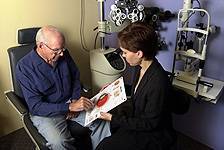Author: Dr. Alex Andrich and Patti Andrich
The Vision Development Team
Coping with COVID-19 may be affecting your vision
The American Optometric Association (AOA) defines Computer Vision Syndrome (CVS) as, “a group of eye and vision-related problems that result from prolonged computer, tablet, e-reader and cell phone use.”
Many screens have glare, bright light, or poor contrast, which can make the eyes tired and dry after an extended period of use.
Individuals with uncorrected vision or poor functional vision skills have to work harder to see and process the visual information presented on the screens.
The frequent, long episodes of exposure to computers, cell phones, laptops, computers, iPads, or other digital screens may be to blame for symptoms such as:
- Disrupted sleep patterns
- Headaches
- Eyestrain
- Fatigue
- Neck, back, and/or shoulder pain.
Contact an eye doctor near you if you experience any of these symptoms after prolonged use of a digital device, you may be suffering from CVS.
SEE RELATED: Headaches and Vision Therapy: Top 5 Q&A
COVID-19 and CVS
Prior to the COVID-19 pandemic, the number of people diagnosed with CVS was already on the rise.
Now, in the pandemic’s wake, the number of people reporting symptoms of CVS has grown exponentially.
The increase in CVS may be related to the online solutions we are currently using to ensure that children can continue to learn and adults can continue to work. Unfortunately, the increase in time spent in front of the screen may pose unexpected health risks.
Fortunately, your optometrist can help keep you working and learning safely in our new digital world. Your eye doctor may prescribe stress-reducing lenses to reduce your visual strain, or suggest blue-blocking lenses that block or absorb the blue light waves produced by electronic screens.
Vision skills and CVS
Additionally, optometrists who test functional vision skills can look for other factors that may be exacerbating symptoms— such as, problems with visual coordination or visual perception.
Poor vision skills can contribute to eyestrain.
If your eye doctor identifies poor focusing, tracking, or convergence skills, or visual perceptual challenges, they may prescribe a course of vision training, also known as vision therapy.
Vision training for CVS
Vision training, along with stress-reducing lenses, and or blue-blocking glasses for computer use, may just be what you need to relieve symptoms from CVS and restore comfortable vision.
LEARN MORE: Guide to Eye Conditions
If you, or someone you love complains of headaches, eyestrain, dry eyes, or vision changes after prolonged screen time, schedule an appointment with an optometrist.
Your optometrist has their eyes on your ocular health.










